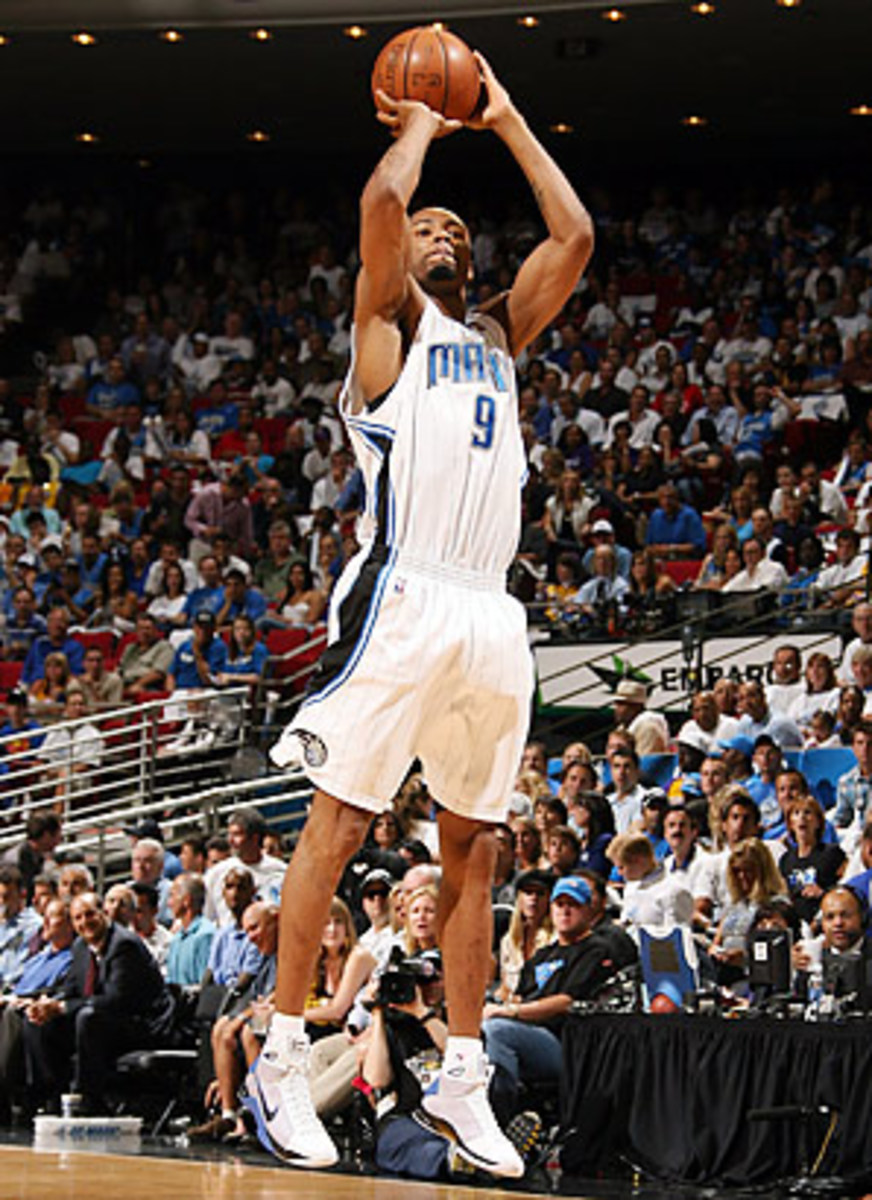Importance of confidence in Finals
In the end, perhaps it was a bit of both. The Magic players finally found their shooting range, without which their four-out, one-in offense becomes little more than an NBA version of a pickup game down at the Y, with everyone taking a turn chucking a brick from the outside (hey, look, I can miss that shot too!). Surely, this shooting revival had nothing to do with the Magic being back home. Just as no doubt it's mere coincidence that during the conference finals and Finals, Rafer Alston is 12-of-24 on three-pointers when playing at Amway Arena and 3-of-22 when playing on the road. (Which leads one to wonder if Stan Van Gundy should just platoon Alston, playing him 48 minutes at home and telling him to take the night off on the road. He could even dress in street clothes, allowing for a possible Adonal Foyle sighting, because frankly, this world would benefit from a little more Adonal Foyle.)
On the other hand, if you're the Lakers and you know you nearly beat a team that shot 62.5 percent for the game, you have to feel pretty confident about your chances in Games 4 and 5. As Phil Jackson said after Game 3, referring to the Magic's hot shooting, "That tends to even out." Which is to say, Alston only hits so many pull-up 22-footers, as he did in the first half, before he's due for a side-of-the-backboard special (as he did upon being re-inserted in the third quarter). Which brings up another point: Isn't it remarkable that an NBA player, a starter no less, can hit the side of the backboard on an open jump shot in the NBA Finals? Can you imagine Roger Federer at Wimbledon tossing the ball to serve and completely whiffing on it?
It's part of what makes shooting such a tricky art. If you want to see an impressive display of perimeter marksmanship, show up an an hour and a half early to a Magic game some time and watch J.J. Redick. Moving around the arc, Redick has one of the most graceful shots you'll ever see: feet square, good lift, elbow-in, the type of backspin that causes the net to sing upon impact (Schwick! Schwick!). The other day Redick hit 14 in a row from the NBA line and each one was dead-on. Then, that night in the game, he got a wide-open look at the top of the key in the fourth quarter. Same shot he's taken a million times -- and that may not be as much of an exaggeration as you think -- and suddenly he's rushing it, pushing it, thinking about it. It wasn't even close.
Compare that to Rashard Lewis. Even during Game 2 in L.A., when Lewis scored 34 points and hit six threes, it never looked like his shot was going in when he released it. It was (and is) flat, has no rotation (except for the occasional sideways rotation) and he launches it with an awkward, high release that, in its lead-up, brings to mind a man trying to balance something on his head. His shot does not sing. It doesn't even hum. Yet, of course, Lewis makes them. Just as Reggie Miller made them, even though his elbow pointed the wrong way and his wrist clicked against his off hand on his follow-through.
That's because those guys -- Lewis and Miller -- believe they are going to make the shot. When Redick gets the ball out there, I'm not sure he really thinks he's going to make it. Same goes for Alston and, on the Lakers, Jordan Farmar and Sasha Vujacic. Look at the stats for the postseason and it's remarkable to see who's suddenly a marksman. Vujacic, a man whose nickname is the Machine on account of his (purported) shooting, is at 32.7 percent on threes while Lamar Odom, who never has and never will receive a moniker based on his shooting (unless it's Flatline), is at 46.7 percent. Redick, only the greatest college shooter of his era, is at 37.5 percent, and Shannon Brown, who wasn't even the best shooter at his college, is at 48 percent.
It's part what makes the Finals so fascinating to watch: seeing who wants that shot and who starts to dread it. It is said that pure shooters are born, not made. In the postseason, however, anyone can be one for a game. Or, as the Magic are hoping with Alston and Mickael Pietrus and company, three more games.





